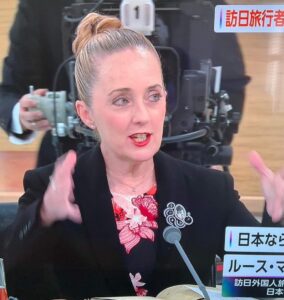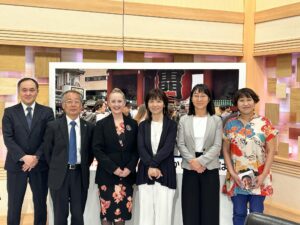Just two days after Jarman International celebrated its 12th anniversary, Jarman’s appearance on Sunday Debate (Nichiyou Touron), a nationally-televised NHK broadcast, was an auspicious step forward in cementing Jarman as an expert on tourism in Japan.

“A fellow board member at one of my meetings said, ‘it is a really serious show…will you be okay?’, and that made me even more excited about bringing some sense of hope and positivity to the situation of speedy growth in visitors to Japan”, says Jarman as she reflected on her thoughts before the live broadcast Sunday morning.
With some 2% of the Japanese public tuning in via television and radio, this reputable weekly debate show (similar to PBS NewsHour in the US) reaches business leaders, industry influencers, etc., across the country.

The discussion centered on the current growth of international visitors and the opportunities as well as challenges Japan faces. The head of the Kamakura Tourism Association spoke of ideas to make sure local residents can ride the popular Enoden train even on days when visitors from around the world squeeze onto the iconic train for spectacular views of the ocean, Enoshima Island and Mt. Fuji.
Although there were varying ideas for how this challenge should be faced, all six panelists agreed that tourism in Japan needs to be a win-win for all. Destination management needs to be focused on making sure that no organization or locality is left behind in this surge of new business, so carefully gauging trends and where funds are ending up, will be key.
I was able to introduce the Hawaiian word ‘kuleana’ into the conversation. This word refers to the responsibility both hosts and guests have to protect the natural environment. That means making sure that an increase in tourism does not equal an increase in unhappiness for the local community or have any negative impact on precious natural and cultural resources. We also discussed how prices are rising at accommodation facilities and although many people seem to fear that clientele will decrease due to prices going up, I emphasized that the weaker yen makes it easier for visitors to pay higher rates. However, at the same time, expectations for service quality and hospitality will go up. I hoped to convey the message that Japan can have great confidence in how much the world loves and wants to visit the country, as well as make sure that everyone, including the smiling bell person at the local hotel, really FEELS the growth and benefits from it in tangible ways (basically higher salaries), says Jarman.
 Japan is keen to reach 60 million visitors per year by 2030. With Japan being selected as the world’s number one destination by travelers around the world, we expect the goal will be reached. Doubling current numbers, the challenge of opening up outlying regions to eager visitors and helping host locations feel confident and positive about such sudden growth, is a very big challenge for sure. As presented by the discussion on Sunday, Jarman is ready to be deeply involved in this effort towards building a new economic pillar for Japan. The path ahead is not easy, but we want to welcome this new challenge with open arms and a big smile.
Japan is keen to reach 60 million visitors per year by 2030. With Japan being selected as the world’s number one destination by travelers around the world, we expect the goal will be reached. Doubling current numbers, the challenge of opening up outlying regions to eager visitors and helping host locations feel confident and positive about such sudden growth, is a very big challenge for sure. As presented by the discussion on Sunday, Jarman is ready to be deeply involved in this effort towards building a new economic pillar for Japan. The path ahead is not easy, but we want to welcome this new challenge with open arms and a big smile.
